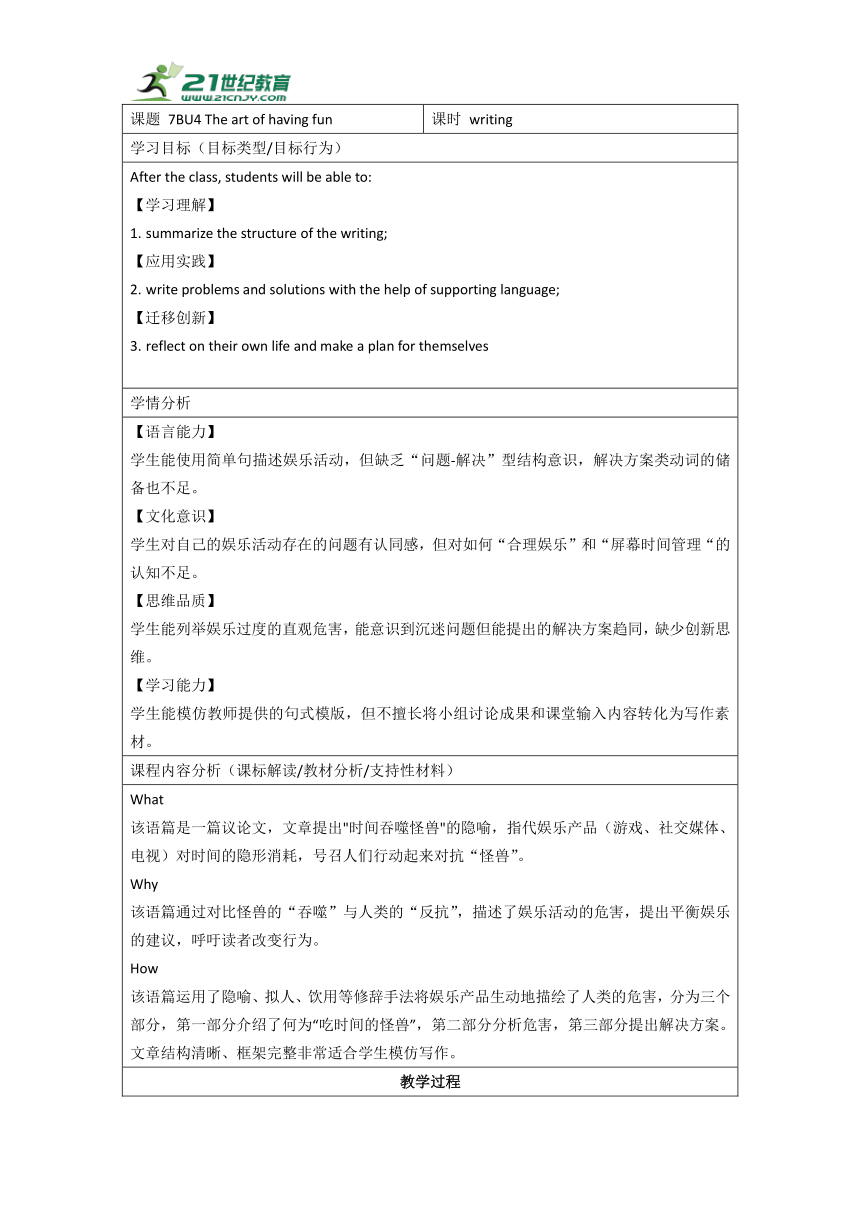
课题 7BU4 The art of having fun 课时 writing 学习目标(目标类型/目标行为) After the class, students will be able to: 【学习理解】 summarize the structure of the writing; 【应用实践】 write problems and solutions with the help of supporting language; 【迁移创新】 reflect on their own life and make a plan for themselves 学情分析 【语言能力】 学生能使用简单句描述娱乐活动,但缺乏“问题-解决”型结构意识,解决方案类动词的储备也不足。 【文化意识】 学生对自己的娱乐活动存在的问题有认同感,但对如何“合理娱乐”和“屏幕时间管理“的认知不足。 【思维品质】 学生能列举娱乐过度的直观危害,能意识到沉迷问题但能提出的解决方案趋同,缺少创新思维。 【学习能力】 学生能模仿教师提供的句式模版,但不擅长将小组讨论成果和课堂输入内容转化为写作素材。 课程内容分析(课标解读/教材分析/支持性材料) What 该语篇是一篇议论文,文章提出"时间吞噬怪兽"的隐喻,指代娱乐产品(游戏、社交媒体、电视)对时间的隐形消耗,号召人们行动起来对抗“怪兽”。 Why 该语篇通过对比怪兽的“吞噬”与人类的“反抗”,描述了娱乐活动的危害,提出平衡娱乐的建议,呼吁读者改变行为。 How 该语篇运用了隐喻、拟人、饮用等修辞手法将娱乐产品生动地描绘了人类的危害,分为三个部分,第一部分介绍了何为“吃时间的怪兽”,第二部分分析危害,第三部分提出解决方案。文章结构清晰、框架完整非常适合学生模仿写作。 教学过程 学习任务 ① 学习活动 Free talk I like... / I enjoy... / I am interested in... / I have interest in... Because it makes me... / I feel... Let's review social sore deaf real outside jog fresh hiking 教学活动 教师提问: What fun activities do you like to do (教师板书学生答案) Why do you like to do this activity (支持性问题:How do you feel when doing this activity ) 过渡语:But if you spend too much on having fun, you may be attacked by the time-eating monster. 教师将表格投屏,请学生根据回忆完成。 The time-eating monster Forms: games, 1. _____ (社交的) media and TV shows. It can make us: get lost in its world. become couch potatoes with 2._____ (酸痛的) necks and dry eyes. be 3._____ (不愿听的) to the 4._____ (adj. /r l/) world. We can: stand up and leave the screens. go 5._____ (adv. /a t sa d), feel the sun on our faces, and 6._____ (慢跑)in the 7._____ (新鲜的) air. play tennis or go 8._____ (hike) with friends. 教师呈现总结词:problem和solution。 学习任务 ② 学习活动 Think 学生自由作答,不做评价。 Physical: Too much gaming makes my eyes ___dry____. Watching videos too long (看太久的视频) gives me a headache. I sleep late (很晚睡觉) and feel tired (adj. /ta d/). No exercise makes me unhealthy (不健康的). Mental: 1. I feel guilty (内疚的) after watching short videos too long (看很久短视频). 2. I become addicted to (上瘾) the phone without noticing (意识到) it at all. 3. I get lost in (迷失) short video apps and spend too much time (花太多时间) on them. 4. We are deaf (不愿听) to real world. Social: 5. We miss out on (错失) sweet moments with loved ones. 6. I feel lonely (adj. / l nli/) when I stop playing games. Study: 1. I forget to do homework (做作业) and can’t pass (通过) tests. 2. If I stay up late at night, I can’t ... ...
~~ 您好,已阅读到文档的结尾了 ~~